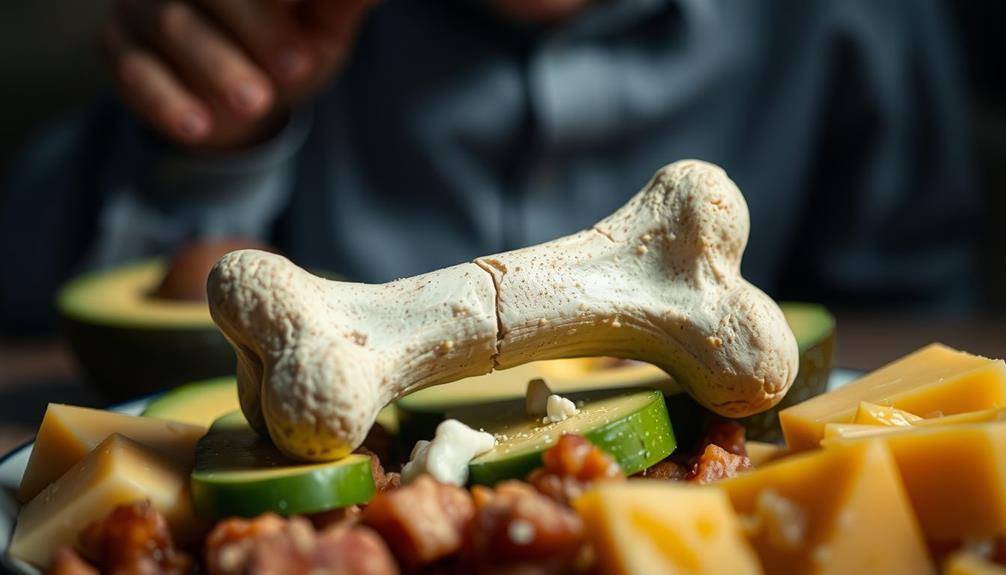The keto diet's low-carb, high-fat approach can pose hidden risks to your bone health due to potential nutritional deficiencies. When you limit carb intake, you might not get enough essential vitamins and minerals, particularly calcium and vitamin D, essential for strong bones. A lack of these nutrients can increase your risk for osteoporosis and fractures. Rapid weight loss may prioritize fat loss over preserving bone density, too. It's important to incorporate calcium-rich foods and high-quality protein into your meals. By understanding these factors, you'll better protect your bone health while benefiting from the diet's weight loss effects. There's more to uncover about maintaining balance. Many people have experienced transformative keto success stories, but it’s crucial to prioritize overall health, including bone health, while following the diet. Seeking guidance from a healthcare professional or registered dietitian can help ensure that you are meeting your nutritional needs and safeguarding your bones. By incorporating weight-bearing exercises into your routine, you can also promote bone strength and reduce the risk of osteoporosis. Remember, achieving success on the keto diet should not come at the expense of your long-term health and well-being.
Key Takeaways
- Nutritional deficiencies, particularly in calcium and vitamin D, can lead to weak bones and increased fracture risk on a keto diet.
- Rapid weight loss from the keto diet may prioritize fat loss over maintaining bone mass, affecting bone density.
- Low protein intake due to restricted food options may contribute to bone density loss and increased fracture risk.
- The "keto flu" can cause symptoms like muscle cramps and fatigue, which may indirectly impact physical activity and bone health.
- Incorporating nutrient-dense foods and regular weight-bearing exercises is crucial for maintaining bone strength while on the keto diet.
Understanding the Keto Diet

When you plunge into the world of the ketogenic diet, you're embracing a low-carb, high-fat approach that transforms how your body fuels itself. By drastically reducing your carbohydrate intake to under 50 grams a day, you push your body into a state called ketosis.
In ketosis, your body shifts from burning carbs for energy to burning fats, producing ketone bodies that can enhance your overall health. Many people report benefits such as effective weight loss, improved blood sugar control, and increased energy levels.
However, while you're enjoying these perks, it's essential to follow dietary guidelines to maintain balanced nutrition and avoid pitfalls. Understanding this diet's mechanics can empower you to make informed choices for your health journey.
Nutritional Deficiencies and Risks

The ketogenic diet's allure often overshadows its potential nutritional deficiencies and associated risks. While cutting carbs can lead to rapid weight loss, it can also mean missing out on essential vitamins and minerals found in fruits, grains, and legumes.
This can lead to deficiencies in magnesium, potassium, and vitamin D, which are vital for overall health. You might experience muscle cramps, fatigue, or digestive issues like constipation due to lower fiber intake.
Furthermore, the "keto flu" can hit hard as your body adapts, causing headaches and irritability. To counter these effects, you'll need to be strategic about your food choices, focusing on nutrient-dense, low-carb foods while considering supplements to fill any gaps in your diet.
Effects on Bone Density

Nutritional deficiencies can have far-reaching impacts, particularly on bone density. When you cut out carbohydrates on the keto diet, you're likely missing out on key vitamins and minerals that support bone health.
Low intake of calcium and magnesium can weaken your bones, increasing the risk of osteoporosis over time. Additionally, rapid weight loss can affect bone density, as your body might prioritize fat loss over maintaining bone mass. If you're not careful, this can lead to a significant decrease in bone strength.
To counteract these effects, it's crucial to incorporate nutrient-dense foods and maintain an active lifestyle. Regular weight-bearing exercises will help strengthen your bones and offset potential losses associated with the keto diet.
Importance of Calcium and Vitamin D

Calcium and vitamin D play an essential role in maintaining bone health, especially on the keto diet. Without adequate calcium, your bones can become weak and brittle, increasing the risk of fractures.
Vitamin D is vital because it helps your body absorb calcium effectively. On a keto diet, you mightn't get enough of these nutrients since many high-calcium foods, like dairy, can be limited.
To counteract this, include leafy greens, nuts, and fortified foods in your meals. You may also want to take into account supplements, but always consult with a healthcare professional first.
Prioritizing these nutrients will help you support your bone health while enjoying the benefits of the keto lifestyle.
Role of Protein in Bone Health

Maintaining strong bones hinges greatly on adequate protein intake, as protein plays an essential role in bone health and density. You need protein to support muscle mass, which in turn helps protect your bones from fractures and loss.
High-quality protein sources, such as lean meats, fish, eggs, and dairy, provide the necessary amino acids for bone formation and repair. When you're on a keto diet, it's vital to guarantee you're getting enough protein, as low carb intake might lead to a decrease in overall consumption.
Insufficient protein can contribute to bone density loss, particularly if you're not balancing it with other essential nutrients. Prioritizing protein in your meals can help maintain your bone strength and overall health.
Strategies for Nutritional Balance

Achieving a balanced diet on the keto plan requires careful planning and attention to nutrient intake. Focus on incorporating high-quality fats, like avocados and olive oil, to provide the energy your body needs.
Make certain to include plenty of leafy greens and low-carb vegetables to guarantee adequate fiber and essential vitamins. Don't forget to add sources of calcium, such as cheese or fortified almond milk, and consider oily fish for vitamin D.
To support magnesium levels, incorporate nuts and seeds into your meals. You might also want to think about taking supplements, but consult a healthcare professional first.
Exercise and Bone Strength

Incorporating regular exercise into your routine not only supports overall health but also plays a significant role in strengthening your bones, especially while following the keto diet.
Weight-bearing exercises, like walking, running, or resistance training, help stimulate bone growth and density. By engaging in these activities, you can counteract potential bone loss associated with nutrient deficiencies on keto.
Aim for at least 150 minutes of moderate-intensity exercise each week, mixing in strength training at least twice. Don't forget to include balance and flexibility exercises to enhance overall stability.
Staying active not only boosts your bone strength but also helps mitigate some risks of the keto diet, ensuring you maintain a healthy, resilient body.
Frequently Asked Questions
Can the Keto Diet Affect My Overall Hormonal Balance?
Yes, the keto diet can affect your hormonal balance. By drastically reducing carbs, it may alter insulin, cortisol, and thyroid hormone levels, potentially leading to fluctuations in energy, mood, and metabolism. Monitor your body's responses closely.
How Does Keto Influence Joint Health and Inflammation?
The keto diet can reduce inflammation, which may benefit joint health. By promoting fat oxidation and ketone production, you might experience less joint pain. However, make certain you're getting adequate nutrients for overall well-being.
Are There Specific Foods to Avoid for Better Bone Health on Keto?
To promote better bone health on keto, you should avoid processed foods high in refined sugars, excessive sodium, and trans fats. Focus on nutrient-dense options that support calcium and vitamin D intake for stronger bones.
What Are the Long-Term Effects of Keto on Aging Bones?
The long-term effects of keto on aging bones can include potential decreases in bone density and increased osteoporosis risk. You should prioritize calcium, vitamin D, and regular exercise to support your skeletal health while following the diet.
How Can I Monitor My Bone Health While on the Keto Diet?
To monitor your bone health on the keto diet, regularly check calcium and vitamin D levels, incorporate weight-bearing exercises, and consult a healthcare professional for assessments and personalized dietary adjustments to maintain bone strength.
Conclusion
As you embrace the ketogenic diet, don't let the allure of weight loss overshadow your bone health. Imagine your body as a sturdy house; without a solid foundation of nutrients like calcium and vitamin D, it risks crumbling under pressure. By prioritizing these essentials and staying active, you can build not just a healthier body but a resilient one. So, take charge of your journey—nourish your bones and let them support you every step of the way.









